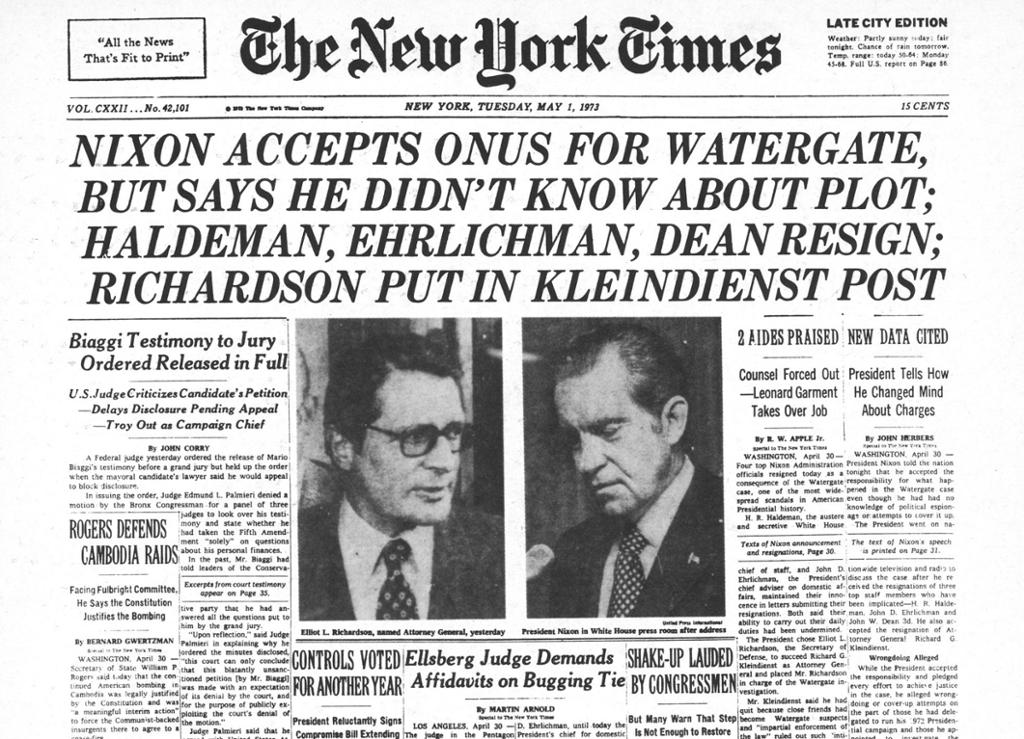Investigative Journalism

A journalist is well aware of the impact a good story may have, and many reporters want their work to make a difference. They want to provide information to the public about shady business in the community so things can come out into the light and eventually be put right, either it be corrupt politicians or unethical proceedings in a company. Not unlike a detective the reporter follows leads and makes inquiries, hence this kind of reporting is usually referred to as investigative journalism.
Investigative reporters may work on a tip from an informer or a whistle-blower inside the system. An important principle to safeguard a free press is that journalists do not have to reveal their sources, not even to the police if it should come to that. The classic example of investigative journalism is the Watergate-affair in the early 1970s. Two reporters from the Washington Post, Carl Bernstein and Bob Woodward revealed that during an election campaign the Democrats’ election headquarters in the Watergate building was broken into by the Republicans to get some important documents. There was a cover-up directed by the Nixon administration that was also revealed. The case escalated to scandalous proportions and the rest is history; President Nixon had to step down from office in 1974.

This kind of journalism requires determination and courage, because such reporters will certainly encounter resistance from inside the system; many people will of course see it as being in their interest to stop them. It can be a risky business to speak up for ethical principles in the corridors of power. The Watergate scandal wrote Bernstein and Woodward into the history books, and they were rightly credited for courageous journalism. In today’s media many reporters are working with the same agenda, but perhaps with a different approach.

Michael Moore’s documentaries are both acclaimed and criticized, but his work has certainly put important matters on the agenda. One of his films even took home the Golden Palm at the Cannes film festival. American weapon legislation (Bowling for Columbine), conspiracy theories within the Bush administration (Fahrenheit 9/11) and the American health care system (Sicko) are famous examples of Michael Moore’s work. He is known for a somewhat provocative and direct style, and he tends to overexpose his targets in a way that may stop people from taking him seriously.
Louis Theroux has a very different approach. He is a modest and polite person who wins the confidence of his targets thanks to his open and somewhat naïve approach. By exercising his personal charm and asking the correct questions, doors are opened and his objects step out and reveal themselves and what they stand for. He has made documentaries and inside-stories from environments that usually are not covered by an ordinary journalist. He has visited neo-Nazi groups in America, interviewed paedophiles in prison, exposed nationalists in South Africa (where he actually was threatened on camera by the target of the documentary); he has visited brothels and even undergone cosmetic surgery to get an inside look at a dubious industry. He has a very clever and personal way of making his objects open up and talk on camera.
The German writer and journalist Günther Wallraff is another famous personality in investigative journalism. His approach is to get first-hand information by getting inside the environment he wants to investigate. He works undercover and will for example get a job inside a business he intends to reveal. His inside information will then be published in a book or as a series of articles. His uncovering of the methods inside the so-called coloured press in Germany is one of his many crusades. It caused a huge uproar and he was eventually sued by the Bild Zeitung. His life has been threatened many times and he has to live incognito.
Investigative journalism may seem to have a somewhat fishy way of operating with undercover reporters and secret sources. But hunting for and revealing questionable affairs in business or political life must be a priority for an open society, and these investigative journalists work to make a difference by disclosing dodgy dealings and tricky business among us.
Vocabulary
- The word “approach” is used many times in this article – how would you define it in this context?
- Rewrite the sentence “The case escalated to scandalous proportions” into a simpler sentence meaning the same.
- Explain what happens when you are “sued”.
- What does it mean to live “incognito”?